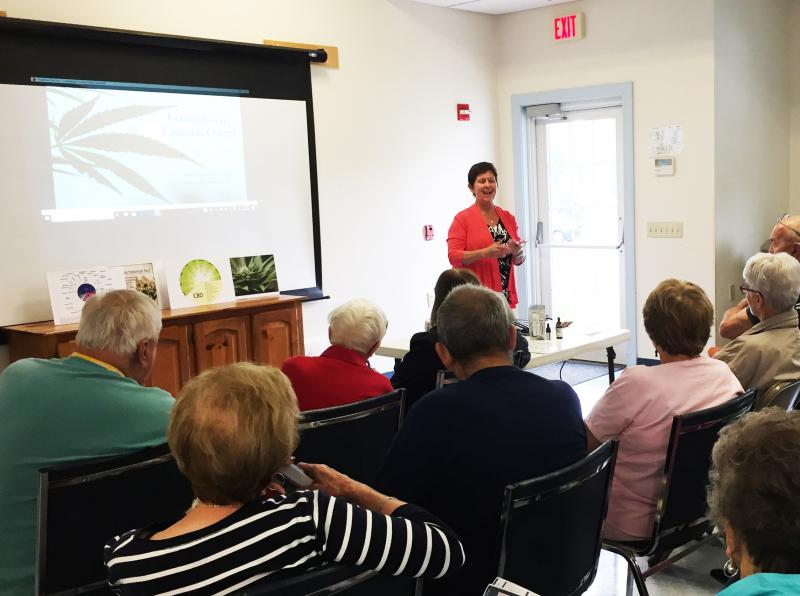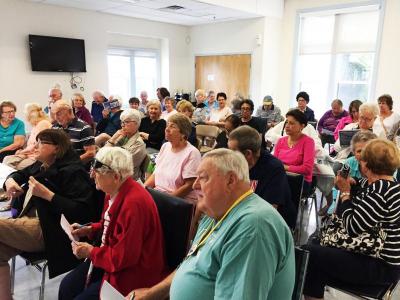Cannabis seminar teaches seniors about CBD
Sixty people sat around the room at the Council on Aging on a rainy Tuesday afternoon, asking questions like “If I get pulled over, will I fail a drug test?” and “How do I eat it?”
They were talking about cannabis, at a June 25 seminar for seniors thinking about using the plant for medical purposes.
Licensed massage therapist and cannabis consultant Kathy Furze-Spencer gave the talk on the history and potential health benefits of the drug — which was legalized for medical purposes in Massachusetts in 2012 and for recreational purposes in 2016.
In her seminar, Furze-Spencer outlined the long history of the plant’s use, ways to consume it, and the “reefer madness” propaganda campaign that made it illegal during the Prohibition era in the early 20th century.
She also spoke briefly on cannabinoids, or the plant’s chemical compounds, as well as the endocannabinoid system — cannabinoids and their receptors produced naturally in the body that regulate signals relating to fertility and reproduction, pain, mood, memory, and appetite.
According to Furze-Spencer, cannabinoids found in marijuana — particularly cannabidiol, known as CBD and widely marketed in recent years — may help people manage pain, stress, and anxiety without the high associated with the drug.
At first she was careful not to make unequivocal claims about CBD’s effectiveness. “Will CBD help?” she asked, before answering herself: “Possibly.”
“You can’t rely on one substance, just like you can’t rely on one pharmaceutical to be a substitute for good health,” she noted. “So keep that in mind.”
During the talk Furze-Spencer emphasized several times that she is not a doctor.
Pamphlets stacked on a side table noted in fine print that many of CBD’s health benefits have yet to be evaluated by the FDA.
But she went on to list the myriad conditions that CBD may help.
Furze-Spencer said that it relieves anxiety, convulsions, depression, acts as a sleep aid and anti-inflammatory, reduces the risk of arterial blockage, and can even help regenerate bone.
She added that she believes CBD helped lessen the severity of a heart attack her husband suffered last year.
The massage therapist also makes and sells topical treatments using cannabis root.
Some in the audience felt the message fell flat.
New Bedford resident George Smith said that the seminar reminded him a little bit of selling “snake oil”, with “everybody looking for a quick fix.”
“People are looking for something that makes them feel better,” he said. “And maybe it helps somebody … [but] you’re on your own. Check with your doctor.”
Most in the audience, however, said that they’d consider using it — and some already were.
“I thought [the talk] was excellent,” said one woman who wanted to remain anonymous.
Although she wasn’t taking CBD herself, she said, she would consider it in the future — adding that a friend of hers took it for pain, and “it worked wonders.”
Eileen Rice, who lives in Dartmouth, takes CBD for a few different health issues. “My son introduced me to it,” she said. “It helps!”
She added that it also helped a friend of hers with constant leg pain. “He’s kind of happy about that,” Rice said with a smile.
Furze-Spencer also answered questions along with CBD Education Specialist Erica Mitchell.
Some types of CBD products could make you fail a drug test, so it’s important to check first, they said.
They also stressed that the compound may interact with a few medications and that people should ask their doctor before trying anything new.
The disclaimers were clear. Said Furze-Spencer, “There are no guarantees.”













